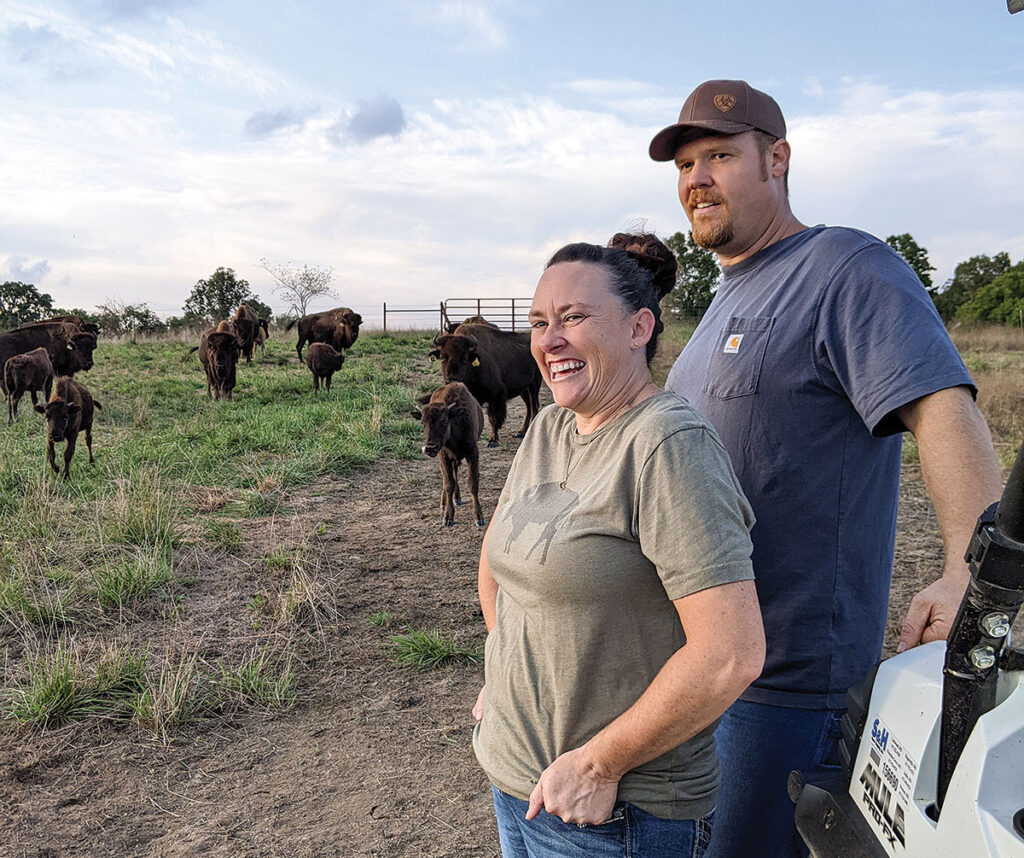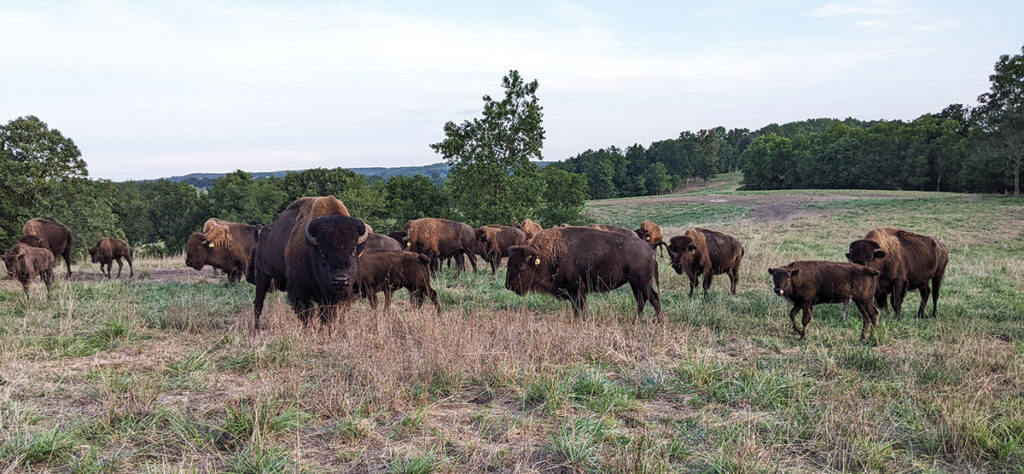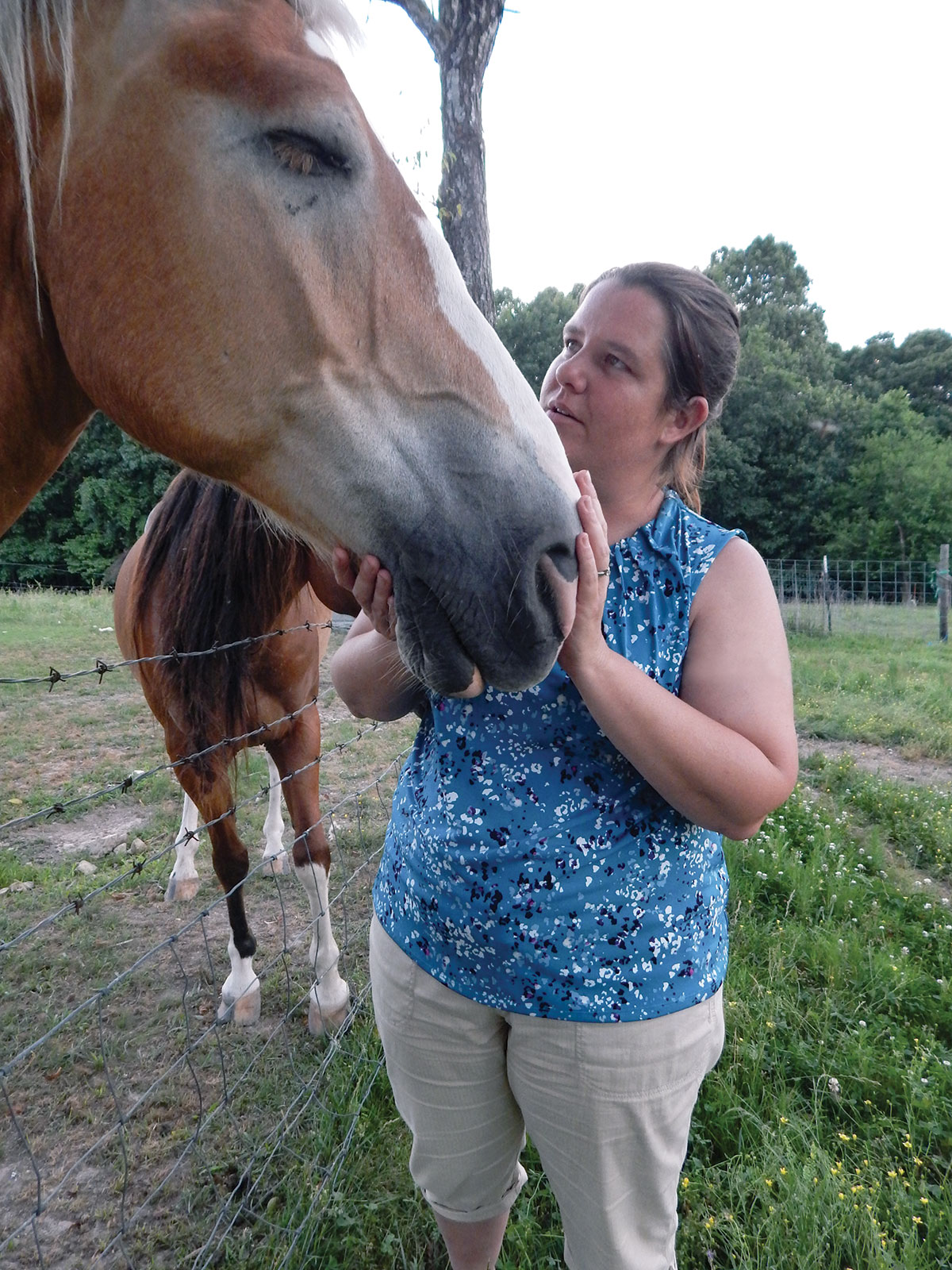
The Bohnenkamps have raised bison for generations and are working to improve genetics
MOUNTAIN GROVE, MO. – For Daniel Bohnenkamp, raising bison came naturally. As a third generation bison farmer, along with his wife Nancy and their three children, they run two herd of bison on their family farm in Douglas County, Mo.
The tradition began with Daniel’s grandparents, Jim and Julie Fox of Seymour, getting their first bison in 1981. In 1988, their son-in-law Wayne Bohnenkamp and his wife Anita began their own bison farm, GrandView Bison in Mountain Grove. Their son Daniel and his wife Nancy married in 2007 and began their first farm in 2011.
“It’s definitely something that I’ve learned to enjoy. They’re such pretty animals that I couldn’t imagine having anything else,” Nancy said. She moved to Norwood when she was 13. Except for raising and showing dairy goats in California, when she was little, bison are her only other farming experience.
The Bohnenkamps moved to a nearby in 2021 and started Hillside Bison, where they currently have two herds that total 60 adult and 28 bison calves.
“Over the years we swapped calves back and forth with Daniel’s dad and kept buying his,” Nancy said of the herd.
“And going to the association sales and try and buy award-winning animals from there,” Daniel said.
One of Daniel’s goals as a bison producer is to breed high-quality genetics.
“We’re starting to do some performance testing on our calves,” he said. “Trying to find a good combination, a genetic line that we can keep improving on. How much weight they can gain in a certain amount of time.”
Daniel is the vice president of the Missouri Bison Association, which currently has about 80 members. It’s a resource for all things bison. They have two sales a year in Missouri, one in the spring and another in the fall.
“We’ve learned a lot along the way,” Nancy said, and they share their knowledge with new bison farmers. “There are several we talk to and work with. When they’re having issues with their animals, they’ll call and see if we’ve ever had any issues like that,” she said. Daniel added, “We’ve helped start several of those [smaller, hobby farms]. They will contact us, we’ll sell them some breeding stock and kind of mentor them. We never stop learning.”
The bison graze and will roam even when limited to smaller fields. They graze on fescue, orchard and Johnson grasses. As they haven’t been on their current farm for long, the Bohnenkamps are trying to build the soil and grasses back up. Bison will roam up to 2 miles a day and usually leave some grass for a future meal.
“We supplement occasionally to get them in our corral system,” Nancy said. “So they know when it comes time to work them, they’ll come in.”
“We always make sure they have minerals to eat. We’ll put out a loose mineral and a mineral tub. They just self-balance,” Daniel said. Minerals vary throughout the year with changing supply and seasons. They locally purchase a commodity-mixed grain feed, but because bison are more of a natural meat, they are not grain finished.
There are many ways that farming bison differs from that of cows. One is in managing herds.

“Cows can share a fence line, bison cannot,” Daniel explained. “So if we try to run our two herds in fields next to each other, that share a fence line, they will become one herd. We try to do rotational grazing. In doing so, you have to watch the weather patterns and plan several moves ahead of where you are. Of course this last summer with the drought, it accelerated my plan and it’s making a few things more difficult as far as finding grazing for them.”
Bison calving is unique too. They have a natural breeding program and membership in the National Bison Association requires signed agreement to not AI animals. Daniel explained that bison were never meant to be domesticated. They breed and calve on their own.
“We’ve never had to pull calf,” Nancy said. “They go hide in the woods and come back a few days later with a calf.”
“From the end of April through the end of July is when we try to get them to calve out,” Daniel said. “We’re working more with the animals body conditioning from July through August to help our conception rate. We’ve been doing this now for four years and brought up our percentages by about 25 percent in calving rates.”
Daniel also works remotely as a systems engineer for Jack Henry of Springfield. Nancy works in town doing bookkeeping for Toby and Erin Thompson. They also have three children, who keep them busy and help out on the farm.
“They’re always out there with us,” Nancy said. “This is the only thing they’ve ever known. They’re really good at it.”
“She’ll probably be the one that takes over the farms,” Nancy said of their daughter Mollee (13). “She does a lot of work. She goes out and puts feed in the tubs. We are working so hard to make sure the kids have a future with them [the bison].”
Belle (18) helped model fourth-generation farming for her siblings. One of Belle’s chores was feeding the bison and she went to state this year for her FFA project and won an award for specialty animal for her work with the bison and keeping records.
Even though son Spencer is 9 years old, he is referred to the ranch manager.
“He always asks questions,” Nancy said. “‘Why are you doing that? Why didn’t you do it this way?’” Additionally he likes driving the side-by-side and feeding the bison. Daniel credits his son with wanting to be involved in planning.
Hillside Bison sells roasts, steaks, ground meat and summer sausage direct from the farm or in Mountain Grove at Meadowbrook Natural Foods.
“The majority of live animals that we sell is right off the farm,” Daniel said. “It’s better for the animals too, it’s less stress for them,” Nancy said. They also sell animals through the Missouri Bison Association’s sales twice a year.
“It’s just one of those things that gets in your blood and you can’t get it out,” Daniel said about farming. “I just have to keep going with it.”







